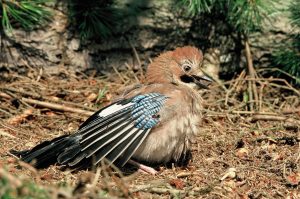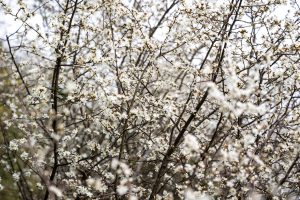Getting set for breeding season
As we head into mid-May and with unsettled weather across the UK reminding us that summer is still some way off, it’s worth remembering that a few species of garden bird may already be on their second clutch of eggs. This is especially true of the Blackbird, which, if sufficient food is available, will sometimes manage a staggering four broods in a season – though two to three is more usual. It’s also an interesting fact that Blackbirds which nest in gardens typically have their first clutch of eggs two weeks earlier than those that nest in Woodland. The reason? Those in gardens are largely reliant on earthworms to feed their young, whereas those in woodland are largely reliant on caterpillars – and have to wait until they’re available.
In order to achieve the remarkable feat of attempting so many broods, the female Blackbird will often leave the feeding of the fledglings to the male, whilst she gets on with building the next nest – something the male bird isn’t involved with at all. This strategy may seem a bit uncaring on the part of the female, but actually it’s essential given the relative vulnerability of the species when it breeds compared to, say, the Starling. This is because the Blackbird’s eggs, and then chicks, are in a nest which offers no external protection, with this resulting in high predation levels from mammals such as weasels and stoats, and birds such as Magpies – and not forgetting domestic cats. Compare that to the Starling which nests in the relative safety of a hole in tree, nest box or cavity in a building, and therefore enjoys a 70% fledgling success rate – and hence why it only needs to have one brood, though will have two is some situations.
But in addition to predation, the other big factor which affects breeding success is availability of food. And no prizes for guessing where this is leading to, because, of course, the single biggest way you can help the breeding success of Blackbirds – and Robins and House Sparrows – is to provide a regular supply of live mealworms. Yes we do bang-on somewhat about it in the breeding season each year, but the fact is that feeding live mealworms makes a huge difference to the breeding success of so many species.
Another great food you can put for adult Blackbirds and Starlings to feed to their fledglings and, for Blackbirds, even chicks in the nest, is sultanas soaked in water, with the ‘soaked’ bit being essential given this is a dried fruit. Along with live mealworms, we’re feeding soaked sultanas here on the farm and getting through a sizeable quantity of both every day – which can only be good for the breeding success levels of both our local Blackbird and Starling populations.


